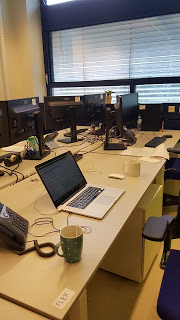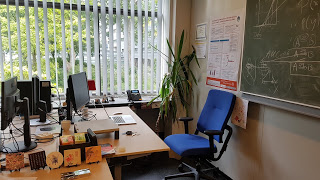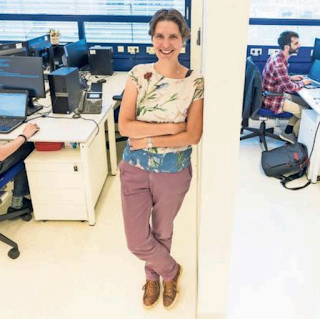I am Suzan Verberne, and This is How I Work as an Academic Parent
 Today, in the subseries about academic parents in the “How I Work” series, I am interviewing Dr. Suzan Verberne. Suzan Verberne (1980) grew up in Twente in the east of the Netherlands. In 1998 she started her academic education at Radboud University, Nijmegen. She obtained her master degree in Natural Language Processing in 2002 and worked in a small company for a couple of years. From 2005 to 2009 she was a PhD student, also at Radboud University, on the topic of automated Question Answering. After her PhD she worked as a postdoctoral researcher from 2009 to 2017, on a variety of projects involving Text Mining and Information Retrieval. As from March 2017, she is an assistant professor (tenure track) at Leiden University for the Data Science Research Programme.Check out her homepage.
Today, in the subseries about academic parents in the “How I Work” series, I am interviewing Dr. Suzan Verberne. Suzan Verberne (1980) grew up in Twente in the east of the Netherlands. In 1998 she started her academic education at Radboud University, Nijmegen. She obtained her master degree in Natural Language Processing in 2002 and worked in a small company for a couple of years. From 2005 to 2009 she was a PhD student, also at Radboud University, on the topic of automated Question Answering. After her PhD she worked as a postdoctoral researcher from 2009 to 2017, on a variety of projects involving Text Mining and Information Retrieval. As from March 2017, she is an assistant professor (tenure track) at Leiden University for the Data Science Research Programme.Check out her homepage.
Current Job: Assistant Professor at the Leiden Institute for Advanced Computer Science
Current Location: Leiden, the Netherlands
Current mobile device: Samsung Galaxy S7
Current computer: MacBook Pro 15 inch
Can you briefly explain your current situation and research to us?
I am an assistant professor (tenure track) in the Leiden Institute for Advanced Computer Science at Leiden University. I am a data scientist, specialised in text data. I am affiliated with the university-wide data science research programme in which I supervise projects on text mining and information retrieval in the biomedical, health, legal, archaeological and policy-making domains. I currently supervise 4 PhD students, a handful of undergraduate students, and I teach two courses per academic year (link to my homepage).
I live in Nijmegen with my husband and two children (3 and 6 at the time of writing, almost 4 and 7). I have a part-time contract so that I can be at home with my children one day a week. My husband also works 4 days and we have 3 days of childcare.
What tools, apps and software are essential to your workflow?
GMail, Dropbox, Todoist. Also: a text editor that allows for advanced searching/replacing and keeping track of multiple files in parallel (currently BBEdit). TeXshop for writing (although my collaborators have caused me to use MS Word as well), and PyCharm for coding.
What does your workspace setup look like?
I have two offices in two different university buildings, I work from home and from the train (my moving office!) I fully depend on my MacBook Pro that allows me to work effectively from everywhere.
 |
| Office number 1 |
 |
| Office number 2 |
What is your best advice for productive academic work?
Plan your long-term important work (proposal writing, paper writing) as first thing in the morning. The rest of the day you will be flooded with other work and you won’t have time to write, which is frustrating at the end of the day. If you reserve the first hour (or one-and-a-half) of the day for the long-term priorities you are sure you progress with the important things over the course of weeks.
What is your best advice for academic parents?
Take vacations with your family, both long and short. Take real weekends: go out with your family, be active. Taking time off has a truly positive effect in the long run. Plus, it always strikes me that the best memories of my children are from family vacations. Being away together.
Also, try not to work on days with the children. Postpone the work to the evening when they are sleeping.
How do you keep an overview of projects and tasks?
I have overview spreadsheets: one for papers, one for projects and proposals. I colour the lines based on status (in preparation, submitted, rejected, in revision, accepted) and keep track regularly.
For task planning, I use Todoist, which allows me to set dates and priority levels. I learned not to be frustrated to not finish all my tasks but to be satisfied with finishing the high-priority tasks.
Besides phone and computer, do you use other technological tools in work and daily life?
Not that I am aware of. We have an iPad at home but I am typically not the person using it (all other family members seem to love the thing).
Which skill makes you stand out as an academic?
Planning and organisation are my talents. I can be very efficient and deadline-oriented. (A pitfall is being too deadline-oriented and doing too many on the last day; the closer the deadline the more efficient I become.)
What do you listen to when you work?
Mostly nothing. I don’t bother to hear co-workers or co-commuters talking. I do have Spotify and listen to an occasional playlist when the train company is too noisy (current playlist: 90s Rock Anthems).
What are you currently reading? How do you find time for reading?
A book about the history of the neighbourhood we will move to next month (Hees in Nijmegen).
I don’t find a lot of time for reading honestly. On vacations, when there is no Netflix and work to fill my evenings, I read a number of books. The rest of the year very few.
Are you more of an introvert or extrovert? How does this influence your working habits?
Extrovert. I communicate a lot, both in written and in spoken form. I try to be open and honest to colleagues, supervisors and students. I feel that I failed when someone tells me I was not clear to them.
What’s your sleep routine like? Has it changed significantly since becoming a parent?
Roughly 22.30 to 6.30. When I became a parent it changed dramatically in the sense of: going to bed earlier, sleep with many interruptions, and getting up earlier. Now my children are getting older and sleep through most of the nights, I am happy with a regular sleeping schedule where I go to bed between 10 and 11 PM and wake up between 6 and 7. To be honest, I have better sleeping habits now than before we had children because I often was away in the evenings and went to bed too late, which caused me to be tired during daytime.
What’s your work routine like?
Different depending on the week day because my husband and I share the responsibilities for bringing the children to childcare/school and picking them up again.
On Mondays I work from home or have meetings that are relatively close by, so that I can bring and pick up the children. On Tuesdays my husband brings and picks up the children and on Wednesdays he does not work — those two days I leave for work at 7.15 in the morning and return around 6.15 in the evening so that I can have dinner with my family and bring the children to bed. On Thursdays I don’t work. On Fridays I bring the children to daycare and then leave for work, starting later. I return home before 7 in the evening, unless I have work events to attend in the late afternoon.
I often do some work in the evening but typically only for one hour, finishing some tasks and replying to emails (between 8 and 9 — when the children are sleeping).
How is it like to be a parent where you work? Are your colleagues supportive and understanding?
The combination can be difficult sometimes. I have to say no more often than colleagues without children. I only attend one or two international conferences per year and I have not been to conferences outside Europe for 7 years. Also I have to set priorities for events at work and miss a number of relatively important events such as the opening of the academic year, and the monthly drinks at the institute. However, I have not experienced complaints from direct co-workers about not being available late in the afternoon, or evenings, or Thursdays.
How much maternity or paternity leave (if any) did you get and was it paid leave?
I did not use any. I have a part-time contract.
Which childcare services are you using? Does university provide support in finding and funding childcare?
I believe they do, but we have childcare close to where we live (and close to the school).
How is your parenting style?
Difficult question! When the children were younger I was leaning toward attachment parenting: I breastfed both children up to two years, carried them in slings and we co-slept regularly. Most of that was motivated by pragmatism, not so much a principled decision I must admit.
At the same time, we have always be working parents relying on professional childcare from a young age (3 months, which is standard in the Netherlands).
Now they grow older I cannot say we have a particular parenting style. There is quite some talking involved, we try to take our children seriously (although toddler tantrums are sometimes difficult to rationalise), and I think we have a little bit of focus on social relations — the importance of having friends and contacts you trust and are loyal to. We have a few strict rules on the things we find important (the ‘pick your battles’ strategy).
What’s the best advice you ever received?
In parenting: “het is een fase” (‘it is a phase’), which means that challenges with children (infants/toddlers/preschoolers/…) often go away after a while; you can hardly influence that.
In work: this image

